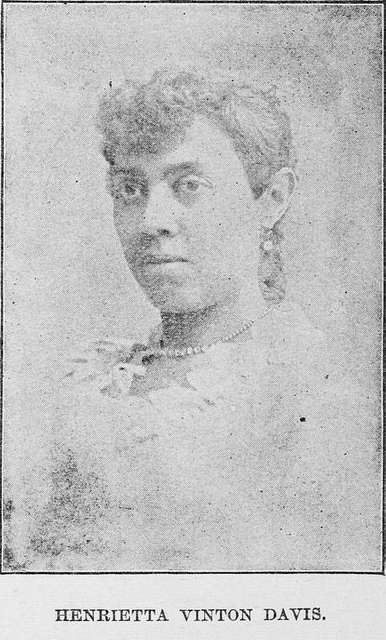“The greatest woman (and a jewel) of the Negro race today," Marcus Garvey[i]
 Henrietta Vinton DavisNew York Public Library
Henrietta Vinton DavisNew York Public Library
Henrietta Vinton Davis is an accomplished role model of the 19th century. She was a teacher, actress, elocutionist, playwright, politician, activist, International Organizer of the UNIA, and Vice President of Black Star Line.
Davis was born in Baltimore on August 25th, 1860 to Mary Ann Johnson and Mansfield Vinton Davis. Shortly after her birth, her father died and her mother remarried George A. Hackett, an influential member of Bethel African Methodist Episcopal Church.
When Hackett died in April 1870 Mary Ann Hackett and Henrietta moved to Washington, D.C. Henrietta was educated in the public schools, so successfully that, at the age of fifteen, she passed examinations to become a teacher. She went on to teach in Maryland and Louisiana, but in 1878 she moved from teaching to work as an assistant to Frederick Douglass[ii] at the Office of the Recorder of Deeds in Washington D.C., becoming the first black woman to be employed by this public office. In Washington, Davis also worked as a copywriter for the politician, George A. Sheridan.
Davis’ acting career began in earnest in 1883 when, introduced by Douglass, she performed speeches of Shakespeare’s leading ladies at D.C.’s Marini’s Hall. She went on to tour New York, Detroit, and other US cities, returning to D.C. in 1884 where she performed scenes from ‘Macbeth’, ‘Richard III’, ‘The Merchant of Venice’ and ‘Romeo and Juliet.’
Davis started her own theatre company in Chicago in 1893, traveling to the Caribbean, and collaborated on writing ‘Our Old Kentucky Home.’ Sadly, though, Davis was never allowed to perform the Shakespearean roles in full productions. According to Errol Hill in his book ‘Shakespeare in Sable,’ “her career encompass(ed) all of the promise, high expectations, and frustrations experienced by Black actors of her generation.”[iii]
Disillusioned, Davis returned to politics working closely with Marcus Garvey who called her, “the greatest woman of the Negro race.” At the Universal Negro Improvement Association and African Communities League (UNIA-ACL) conference in August 1920, Davis was one of the signatories of ‘The Declaration of the Rights of the Negro Peoples of the World.’ She was also elected as International Organizer and eventually became the second Vice-President and director of the Black Star Line.[iv]
In 1927 Garvey was deported to Jamaica and Davis became President-General of the UNIA until 1940. In 1941 Davis passed away, aged 81, but her legacy lives on as, today, she is considered ‘the physical, intellectual, and spiritual link’ (Wiki) between the Douglass’ abolitionist effort and Garvey’s African Redemption movement.
[i] “Marcus Mosiah Garvey Sr. ONH was a Jamaican political activist, publisher, journalist, entrepreneur, and orator. He was the founder and first President-General of the Universal Negro Improvement Association and African Communities League, through which he declared himself Provisional President of Africa.” – Wikipedia
[ii] Frederick Douglass was an American social reformer, abolitionist, orator, writer, and statesman. After escaping from slavery in Maryland, he became a national leader of the abolitionist movement in Massachusetts and New York.
[iii] ‘Shakespeare in Sable,’ A History of Black Shakespearean Actors. By Errol Hill. Massachusetts: University of Massachusetts Press, 1984.
[iv] A shipping line created to transport goods and African Americans throughout the African global economy.
Page created on 8/25/2021 9:28:26 AM
Last edited 8/25/2021 7:48:12 PM
